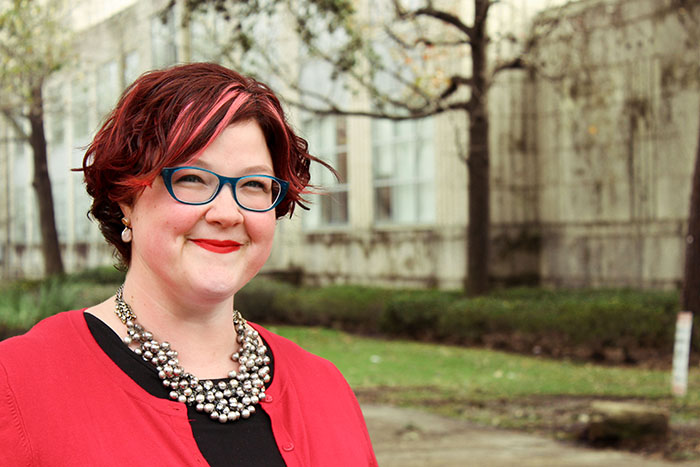Staff Spotlight: Certification Officer Helps Students, the College Meet Standards

Posted June 6, 2019 – On graduation day in May, Lauren Topek took to Twitter to encourage the newest class of teachers entering the profession. After helping them get certified in her role at the University of Houston College of Education, she’s invested in their success.
“Be that teacher every child deserves,” she wrote. “Make learning memorable! We believe in you!”
Topek serves as the College’s certification officer and director of accreditation and accountability. She earned a doctorate in educational leadership from the College in 2012 and returned here to work in September 2018.
At the College, Topek works with students who want to pursue careers in the educational field to make sure they meet state certification requirements. She also helps ensure that programs meet standards set by the Texas Education Agency and the Council for the Accreditation of Educator Preparation.
Topek has taught in classrooms across the East Coast and in Texas and has held district management positions in her 20-year career as an educator. She earned a bachelor’s from New York University Steinhardt School of Culture, Education, and Human Development and a master’s from Harvard University Graduate School of Education.
Topek took time to answer some questions.
Learn more about the College of Education’s certification programs.
Q: Describe a typical day at work.
A: Within one day, I could be doing multiple items. I might be recommending recent graduates for their respective certifications to TEA, working with departments to ensure their incoming cohorts have met all requirements for formal admission to our certification programs, problem-solving with undergraduate and graduate students who may need extra support toward earning their certification, collaborating with faculty and staff on best practices, and fielding questions electronically and in-person about our various certification programs from prospective students.
Q: Do you teach a class?
A: I taught Assessment for Children this spring and will be teaching it again in the fall. The class is for students who want to be middle school and high school teachers. We talk a lot about what you need as a first-year teacher – not just preparation-wise but in terms of lesson planning, content understanding and classroom management; more than that, what students need from the teacher and how the teacher should not just reflect on that but also act, adjust and positively impact student learning.
Q: What are some day-to-day challenges you face?
A: I don’t think I have any challenges. Everyone here at the College of Education has been so welcoming and supportive.
Q: Why did you choose to pursue your doctoral degree at the UH College of Education?
A: After my first year teaching in Houston ISD, I knew it was time for me to pursue my doctorate. I felt the UH program was the best option for me in that the professors and the pathway were the most comprehensive and I was in the fourth-largest city in the country. I knew it was the right choice and felt like home when we had our cohort’s orientation and many of the program’s professors at that time personally knew many and worked with several of my professors from my two previous colleges.
Q: Could you share some significant achievements?
A: Being a program manager for the Apollo 20 program for HISD elementary campuses, I worked with and help grow teachers and administrators in both literacy and math and saw how they could go deeper and connect better with their students. I also helped develop and introduce the first district-wide K-12 arts-integrated strategic plan, the first K-8 summer reading program, the first all-inclusive literacy plan, and the first instructional technology design package that was included in our first bond in more than a decade in Spring ISD.
Q: You’re pretty active on Twitter. How is social media an effective tool in education?
A: Being able to promote and celebrate all the successes that are happening. In addition, there’s so much the education world can offer through social media – whether it’s articles, video clips or links to actual professors across the world that you can connect with. It makes becoming or being an educator much more connected. Because of that, you can be very innovative in the classroom, and the possibilities are endless.
Q: How do you spend your spare time?
A: If I have it, spare time is family time. My husband and I believe it is very important that our kids have that quality time with us. With how busy everyone gets, we don’t want to lose those moments. As they get older, we want to know they have those memories and experiences going into college when they’re not with us anymore.
Q: Advice for students?
A: It’s OK to make mistakes. It’s how you use those mistakes to learn and grow. There are people and a community you can reach out to here at UH so you can ask anybody to help lift you up and move you forward.
–By Alberto Huichapa
–Photo by Jaime Questell